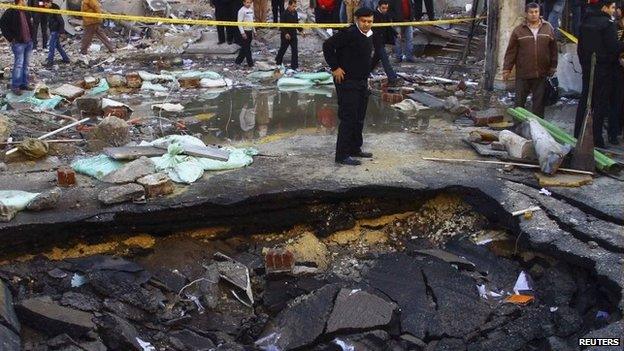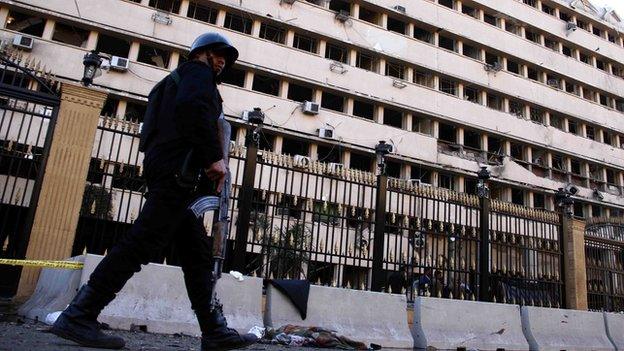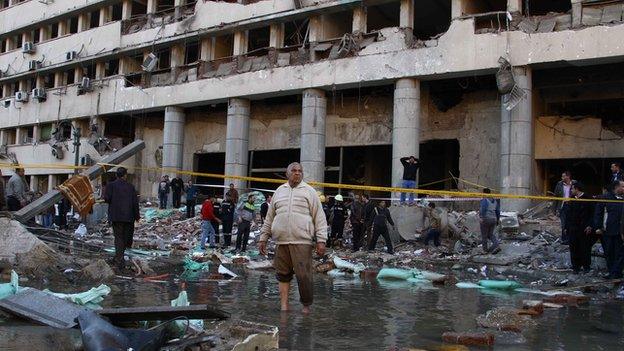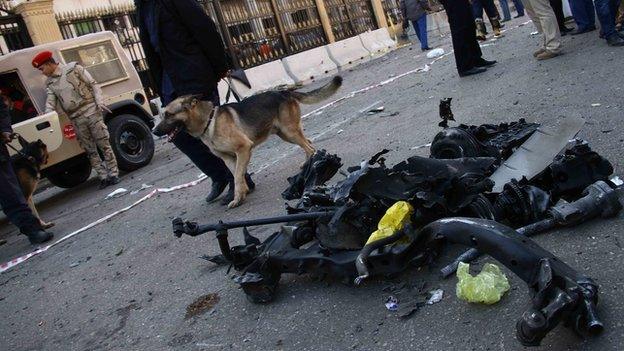Egypt militants step up campaign with Cairo blasts
- Published
The biggest of the explosions hit early morning in what should have been one of the most secure parts of Cairo
Militants have stepped up their campaign against security forces in Egypt with a series of explosions in the Egyptian capital, Cairo.
Six people were killed and some 100 others wounded, with the biggest blast outside Cairo's police headquarters.
The attacks come on the eve of the third anniversary of the 2011 uprising against President Hosni Mubarak.
Meanwhile, 10 were reported killed in clashes between security forces and Muslim Brotherhood supporters.
The explosion outside Cairo's police headquarters left four people dead and wounded at least 76.
Hours later, there were three more blasts elsewhere in the city, killing two people and injuring several more.
Local media report that an al-Qaeda-inspired militant group, Ansar Beit al-Maqdis (Champions of Jerusalem), has said it carried out the attack on the police headquarters.
The group previously claimed responsibility for a car bomb attack on a security building in the northern city of Mansoura in December that killed 16 people and injured more than 100 others.
The authorities blamed the Muslim Brotherhood for that attack - something the group strongly denied - and declared it a terrorist group shortly afterwards.
An angry group gathered outside the bombed police headquarters, accusing the Islamist movement of being behind Friday's attacks. Some shouted: "Death to the Muslim Brotherhood".
The Muslim Brotherhood condemned what it called the "cowardly bombings".
Brotherhood supporters and security forces clashed in Cairo and several other provinces on Friday, with at least ten people reported dead.
The interior ministry said it had arrested 111 people, saying they were "Brotherhood elements" who were "trying to provoke riots".
The Brotherhood has regularly held protests since the overthrow of Islamist President Mohammed Morsi last July.
Tense time
The police headquarters was hit by a powerful blast at about 06:30 local time (04:30 GMT). Black smoke could be seen rising over the city soon after.
Egyptian Interior Minister Muhammad Ibrahim said it appeared to be the work of a suicide bomber.
"A pick-up truck had two passengers inside, stopped outside the security cordon, and the suicide bomber blew himself up," he said.

The blast outside Cairo's police headquarters left a huge crater

The police headquarters and neighbouring buildings were badly damaged in the first, most powerful blast (Photos by BBC Arabic's Mohamed Assad)

The interior minister said it was believed to be the work of a suicide bomber

Police are on heightened alert already, with demonstrations expected ahead of Saturday's anniversary of the start of the 2011 uprising
.jpg)
Gunfire was reportedly heard soon after the blast, and more than 30 ambulances raced to the scene.
The blast left a huge crater and caused extensive damage to the front of the building.
The nearby 19th Century Islamic art museum was also damaged. "The building has been destroyed from the outside, but with regards to the antiquities we'll have to wait and see until we can carry out a thorough inspection," said Antiquities Minister Mohamed Ibrahim.
The BBC's Orla Guerin, reporting from Cairo, says the security directorate is a very significant target and should have been one of the best-protected buildings in the city.
As people in Cairo were taking in news of the blast, a second explosion occurred in the Dokki district of the capital.
One person was killed and 15 were wounded in a blast that, according to one report, targeted police vehicles near the metro station.
A short while later, officials said a third device had been set off beside a police station near the famous Giza pyramids. No-one was hurt.
Some hours later, state television reported a fourth explosion outside a cinema in the Giza district of the city. One person was killed, officials said.
The attacks come at a tense time, with security forces already on heightened alert ahead of the anniversary of the start of the uprising against Mubarak, our correspondent says.
The interior minister said security is being stepped up around the squares where people are expected to gather to mark Saturday's anniversary.
"We have a plan to secure all of this for the anniversary of the 25 January revolution," Mr Ibrahim said. "I am telling the people not to be afraid and go down."
Conditions
Supporters of the Muslim Brotherhood are angry at the army's overthrow of Islamist President Mohammed Morsi last July - a year after he became Egypt's first democratically elected leader.
Although the group has now been banned, interim Prime Minister Hazem Beblawi said any member could take part in forthcoming elections under certain conditions.
Egypt Prime Minister, Hazem El Beblawi: "All groups should be included in Egyptian elections - if they support the constitution"
"He accepts the new constitution... refuses the use of force and he accepts the idea of a secular government, democratic one, open, no discrimination, no mixing of religion and politics, and accepting human rights," Mr Beblawi said in a BBC interview before the attacks.
Amnesty International on Thursday condemned the military-backed government's period in office as one of "unprecedented" violence. It accused troops of regularly committing abuses and said rights and liberties in the country were being eroded.
On Friday, the family of Australian al-Jazeera journalist Peter Greste said that his detention had been extended by authorities for another 15 days.
"There is no end in sight. It could in fact go for up to two years," Mr Greste's father Juris told Australia's ABC channel, referring to the repeated cycles of detention allowed under Egyptian law.
Greste - an ex-BBC correspondent - was arrested on 29 December along with Cairo bureau chief and Canadian national Mohammed Fahmy, and Egyptian producer Baher Mohamed. They have been in detention ever since.
Prosecutors say they are being held on suspicion of using unlicensed equipment, broadcasting false news and possessing fake footage, accusations al-Jazeera rejects.
Also on Friday, the German ARD TV channel said that three of its employees had been attacked by a mob while filming at the site of the blast at Cairo's police headquarters.
The climate for foreign media operating in Egypt has become increasingly hostile, in particular for those accused of covering events in a manner favourable to the Muslim Brotherhood.